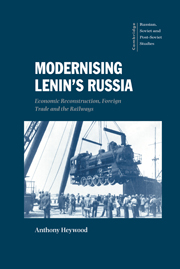‘Heywood’s book makes an important contribution to our understanding of Soviet economic development in the early 1920s. By integrating policies, politics, and people, he has shed light on what was a more complex and bitterly fought issue than previously thought. Cambridge University Press is to be congratulated for including so many interesting photographs and a full bibliography.’
Source: Slavic Review
‘It has obviously been written with great care and attention to empirical detail and should give a welcome scholarly boost to analysing the relation between War Communism and NEP.’
Source: Europe - Asia Studies
‘This is an accomplished piece of scholarly research, which draws on an array of archival sources.’
Source: The International History Review
‘The detail … is handled with a light touch, with some humour, and always with an infectious enthusiasm for the subject of railways.’
Source: Revolutionary Russia
‘Heywood’s study serves a broader readership since, in addition to Russia specialists, those interested in interwar European trade or the international locomotive business in the 1920s will derive much benefit from his study.’
Source: Journal of Economic History
‘The author presents in fascinating detail the confusions and imbroglios of different negotiations, the naiveté of Soviet expectations, even the chicanery that individual contracts seemed sometimes to require.’
Source: The Journal of Modern History
‘Heywood’s research has been assiduous, using recently available archive sources in Moscow and St. Petersburg as well as those in Cambridge, London … and Washington DC … The text is detailed but generally well argued and clear enough for the non-specialist reader to find his or her way.’
Source: The Journal of Transport History
‘This book is highly recommended for specialists and for students of the Soviet experiment.’
Source: American Historical Review
‘This excellent book will interest scholars of soviet foreign policy as well as all who are concerned with early Soviet economic policy-making and the transition to NEP.’
Source: The Russian Review



